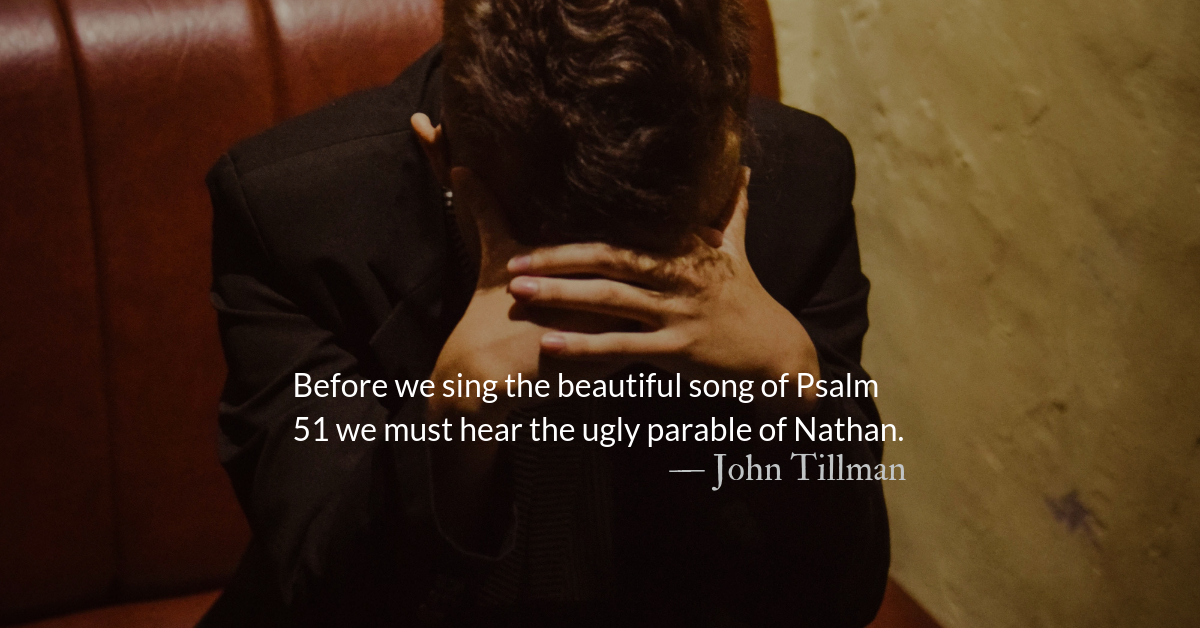Psalm 51.3
For I know my transgressions,
and my sin is always before me.
Reflection: Our Sins Ever Before Us
By John Tillman
Psalm 51 is a Psalm that seems to echo through the New and Old Testaments. Its phrasing, words, and sentiments are often repeated.
In Luke, Jesus puts its words in the mouth of the Tax Collector in his parable about prayer: “have mercy on me, a sinner.”
Jesus alludes to it again in the Prodigal Son’s rehearsed speech of repentance.
The Pharisees adapt its language in John, when condemning the man born blind.
Paul quotes it in the third chapter of Romans and repeats its themes in Romans seven.
Many see this Psalm as a beautiful picture of how we can come to God for forgiveness no matter what we have done, and it is a beautiful picture. But before David could write this song of confession, he had to reach a moment of revelation. Before we sing the beautiful song of Psalm 51 we must hear the ugly parable of Nathan. The ugliness we see is the reflection of our sins.
Like David, we must be forced to see our sin for what it is.
David was already a lustful man—taking a large number of wives and concubines. He was already a bloody man of war and vengeance, so much so that God would not let David build the Temple. These sins eventually led him to a breaking point.
He became an adulterer—purposely seeking out and sleeping with another man’s wife.
He became a liar—seeking to hide his crime and dodge his responsibility for the child.
He became a murderer—murdering Uriah, a friend who was more honorable than David himself.
He became a coward—farming out the murder to someone else.
Before we pray or listen to Psalm 51, we need first to pray that there will be a Nathan in our lives to reveal to us the sins that we are failing to see. The reason David’s sin is “always before him” is because Nathan was there to reveal it.
In our prayers today, may we echo this Psalm as Jesus and Paul did, but first, may we seek revelation from the Holy Spirit of the sins we do not see in ourselves. We can’t confess what we refuse to see.
Racism. Idolatry. Pride. Greed. Lust. Reveal them to us, Lord.
Have mercy on us, Oh God. According to your unfailing love!
Song: “Psalm 51” — Charlie Peacock, Westcoast Diaries Volume Two
Prayer: The Refrain for the Morning Lessons
Create in me a clean heart, O God, and renew a right spirit within me. — Psalm 51.11
– From The Divine Hours: Prayers for Springtime by Phyllis Tickle.
Today’s Readings
Numbers 15 (Listen – 5:09)
Psalm 51 (Listen – 2:19)
Thank You!
Thank you for reading and a huge thank you to those who donate to our ministry, keeping The Park Forum ad-free and enabling us to continue to produce fresh content. Every year our donors help us produce over 100,000 words of free devotionals. Follow this link to support our readers.
Read more about You Are The Man — Embracing Prophetic Responsibility
When Christians speak truth to power, we are empowered with the same Holy Spirit that spoke to Nathan. Whether to a monarch, a magistrate, or a magnate, we represent the message of the Gospel.
Read more about Confession Destroys Denial
We confess we have been deaf to cries of the needy, cries for help, and cries of injustice…Never let us rely on earthly kings to carry out the tasks of the heavenly kingdom.







